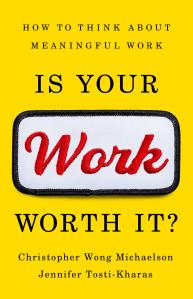Attention, Grads: How to Find Your Dream Job

As another class of college seniors prepares to graduate this spring, many will be entering the workforce, perhaps for the first time. For those who have the luxury of being able to choose between different career paths, they’re likely grappling with questions like, “Should I work for love or money? When and how much should I work? What makes a life worth living outside of my 9-5?”
To help guide them, we’ve recruited two experts in the field. The first is Christopher Wong Michaelson, a PhD, business ethicist, and philosopher with 25 years of experience advising business leaders pursuing meaning and providing work with a purpose. The second is Jennifer Tosti-Kharas, another PhD, Wharton grad, and Professor of Management at Babson College. From their new book, Is Your Work Worth It? How to Think About Meaningful Work, we’ve pulled three tips to help recent grads — or anyone, for that matter — become more intentional about how they approach work.
When it comes to these choices, the stakes are high. In the book, Michaelson and Tosti-Kharas cite an economic study that suggested, “Many people were wasting what would be the most productive time of their lives doing work that was not worth living for.”
So how do you get it right?
Are you looking for a job, a career, or a calling?
When it comes to what you’re looking for employment-wise, Tosti-Kharas and Michaelson offer three main categories: a job, career, or calling.
A job is a means to an end rather than an end in itself. Ideally, it provides you with enough pay and time to find fulfillment outside of work hours. As the authors write, “Many people upon first entering the workforce view their work as job oriented, where work provides spending money and maybe a glimpse of the adult working world but not much else.” A common job in this category would be retail, service, or another minimum wage role.
Careers have a certain level of privilege and a ladder to climb — think, white-collar office workers. While this mindset can have negative connotations (you may be picturing the anti-hero from “Wolf of Wall Street”), people may find meaning in their ascension up the ranks of a company.
A calling is work that is satisfying in and of itself and often contributes to society at large, whether it’s something like a non-profit, the arts, or medicine. Having a calling is practically expected these days, reflected in suggestions like, “Love what you do, and you’ll never work a day in your life.” However, it’s not necessarily the healthiest or the most realistic approach.
You can find fulfillment in a job, career, or calling, the authors stress, and you might cycle through all three as you move through different life phases. Whatever you choose, they offer the following advice: If you’re working primarily for money, consider whether you are being paid fairly relative to others and whether the day-to-day grind justifies whatever the money enables. If you’re working for advancement, think about whether it’s for your own personal status or a more holistic goal, like being able to afford vacations with your family. Similarly, if you’re pursuing a calling, consider what your work brings to others, not just to yourself.
Your favorite hobby may not be your dream job
For many, it’s the ultimate fantasy: quitting their 9-5, becoming their own boss, and pursuing full-time their lifelong passion. Especially in the age of social media, when seemingly everyone is renovating a van or opening their own online store, this can feel like the quickest road to professional nirvana. It’s not, the authors say.
They cite a 1970 study comparing the US policy at the time of paying donors to give blood with the UK’s reliance on volunteers. The researcher hypothesized that paying people for something that was already meaningful could backfire — and he was right. When extrinsic rewards are introduced, they override and therefore diminish the intrinsic enjoyment of doing the task itself. And that’s not just with donating blood. In fact, compared to paying someone a fixed salary, bonuses have been found to reduce motivation. In this sense, opening the bakery of your dreams may not just be a financial risk. It could also sully your love of baking.
What makes the situation even more complex is that we’re particularly bad at predicting our emotions. We can accurately guess their overall vibe, i.e. that opening day of the bake shop will make us incredibly satisfied and proud. But across all types of people and situations, we overestimate how strong our emotions will be and how long they will last. That original euphoria may start to fade once the daily slog of contracts, invoices, and late shipments becomes your reality.
In fact, the further away an event is, the more inaccurate we are when it comes to predicting our emotions. We’re especially liable to oversimplify how we’ll feel, focusing on the dominant emotion rather than what is almost always the reality: mixed emotions. Becoming a full-time baker allows us to express our creativity and set our own schedule (positive!), but it also leaves us without coworkers to commiserate with or any long-term security (negative!). So before you act on your fantasies, think about the less-than-rosy feelings you may be glossing over.
A calling may be overrated
“Follow your passion” makes a nice motivational poster, but it’s not necessarily the best career advice. Especially for young adults, it may be hard to separate a genuine passion from societal norms and expectations. For example, when college students were advised to “follow their passions,” women disproportionately steered clear of traditionally male-dominated fields, like science and engineering. But that wasn’t the case when they were told to maximize their income or help others.
Likewise, if your calling is in a highly competitive prestige field, your chances of success are low. Take classical music. A very rough estimate is that one in perhaps every several hundred hopeful instrumentalists has a chance to perform in a professional orchestra, and even grads from the top conservatories have no guarantee. If you then select for only the orchestras that pay a living wage and are world-class, those odds shrink to something like one in a million.
Or consider another field populated by passionate employees: zookeeping. Those with strong callings sacrificed nearly everything for their animals. As the authors write, they were more likely to put in unpaid overtime work, ultimately earning lower incomes than their lower-calling peers. Strongly called zookeepers were also more critical of their organization and more likely to do what they personally, rather than their employers, think is best in caring for animals.
Under these conditions, the best work may be less work. After companies primarily in the US and Ireland trialed a four-day workweek, revenue and hiring rose, and absenteeism and resignations declined. Employees reported better performance and reduced stress, burnout, fatigue, and work-family conflict, as well as improved physical and mental health and positive emotions.
So as you prepare for your next phase of employment, don’t get too attached to a calling. Consider a job or a career — at least for now.
What is work that’s worth doing in a life worth living? A revealing exploration of the questions we ask and the stories we tell about our work.
According to recent studies, barely a third of American workers feel “engaged” at work, and for many people around the world, happiness is lowest when earning power is highest. After a global pandemic that changed why, how, and what people do for a living, many workers find themselves wondering what makes their daily routine worthwhile.
In Is Your Work Worth It?, two professors – a philosopher and organizational psychologist – investigate the purpose of work and its value in our lives. The book explores vital questions, such as:
- Should you work for love or money?
- When and how much should you work?
- What would make life worth living in a world without work?
- What kind of mark will your work leave on the world?
This essential book combines inspiring and harrowing stories of real people with recent scholarship, ancient wisdom, arts, and literature to help us clarify what worthy work looks like, what tradeoffs are acceptable to pursue it, and what our work can contribute to society.
